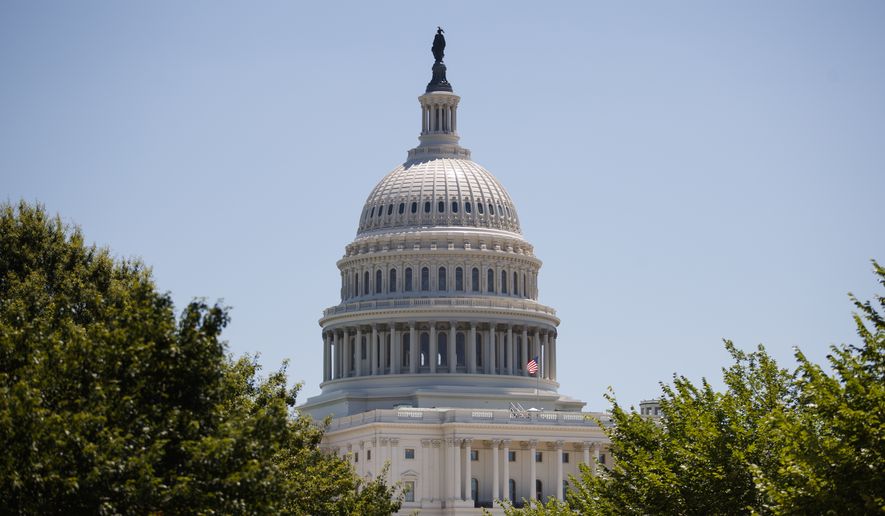House members return on Monday with just nine workdays scheduled before departing again for a month-long summer vacation, giving lawmakers a short time to do a lot, including holding the first hearing by a select committee on the Jan. 6 riot at the Capitol.
House Majority Leader Steny H. Hoyer laid out several initiatives Democrats hope to make progress on before the August recess, including measures on clean drinking water and speeding up the visa process for Afghan interpreters who aided the U.S. military.
“We will have a very busy July in the House as our majority continues to consider essential legislation aimed at tackling our most pressing challenges and delivering results for the people,” Mr. Hoyer, Maryland Democrat, wrote to his colleagues.
The House also will be vying to influence Senate negotiations of President Biden’s $1.9 trillion traditional infrastructure bill and the $3.5 trillion package of health care, child care and anti-poverty spending known as the “human infrastructure” bill.
The big show in the House will be the first hearing of the Jan. 6 select committee.
The hearing is set for July 27 at 9:30 a.m. Eastern. It will feature members of the Capitol Police and the D.C. Metropolitan Police who were on duty the day of the attack.
House Minority Leader Kevin McCarthy has remained quiet on which Republicans, if any, he will appoint to the panel. Most Republicans oppose the select committee, saying it is a political effort by Democrats to blame former President Donald Trump and the GOP for the violence.
The membership of the select committee currently includes Speaker Nancy Pelosi’s picks of seven Democrats and Rep. Liz Cheney of Wyoming, an anti-Trump Republican. So far Ms. Cheney is the sole Republican on the panel.
The select committee is chaired by Rep. Bennie Thompson, Mississippi Democrat.
Under House’s rules for a select committee, the speaker has the power to veto any Republicans whom Mr. McCarthy appoints.
The increased interest in Cuba will also be at the forefront in the coming weeks.
Mr. McCarthy, California Republican, has created a Cuba advisory team to craft policies that aid the push for democracy, amid ongoing protests against the country’s communist regime.
Meanwhile, the House is expected to take up legislation by Rep. Jason Crow, Colorado Democrat, aimed at improving access to visas for Afghans who helped the U.S. during the 20-year war and now face Taliban retaliation after the troop pullout.
The bill, dubbed the Allies Act, has garnered strong bipartisan support with 113 co-sponsors — 79 Democrats and 34 Republicans.
A bill to improve access to clean drinking water will also be considered by the House.
The PFAS Action Act, sponsored by Rep. Debbie Dingell, Michigan Democrat, would create a national drinking water standard, highlighting the dangers of PFAS chemicals, sometimes referred to as “forever chemicals.”
The bill has 49 co-sponsors — 44 Democrats and five Republicans, including Rep. Fred Upton of Michigan.
The House will take up the Consumer Protection and Recovery Act, sponsored by Rep. Tony Cardenas, California Democrat, which would amend the Federal Trade Commission Act to allow the agency to offer relief for people impacted by telecommunications fraud.
The House also will work toward passing some of the 12 appropriations bills that Congress must pass to keep the government open when the new fiscal year begins Oct. 1.
With less than two weeks left in the session, some lawmakers have also urged a cancellation of the August recess.
Rep. Rob Wittman wrote a letter on Thursday to Mrs. Pelosi, California Democrat, encouraging her to cancel recess if members don’t at least get the appropriations bills passed.
“With so much work left to be done, it boggles the mind as to why anyone would feel justified in taking a month off,” wrote Mr. Wittman, Virginia Republican.
Senate Majority Leader Charles E. Schumer told colleagues that they can expect “long nights, weekends, and remaining in Washington into the previously scheduled August state work period.”
Mr. Schumer’s warning comes as the Senate continues to negotiate bipartisan infrastructure legislation.
Mr. Hoyer did not signal any official scheduling changes.
“The House will do what it needs in order to accomplish the same,” Mr. Hoyer wrote to colleagues, echoing Mr. Schumer’s comments.
• Mica Soellner can be reached at msoellner@washingtontimes.com.




Please read our comment policy before commenting.